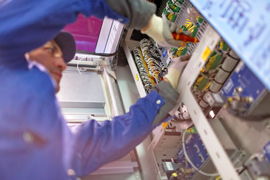Objectives, technological needs, and international aspect
Scientific objectives
The objectives reflect the vision of the joint laboratory SurferLab:
SurferLab strives to work on both scientific and technological objectives while keeping in view a long-term development strategy at international level underpinned by a model of economic development.
-
The activities carried out must contribute to improving the performance of a system (eg. in railways: rolling stock or a fleet of rolling stock) and in particular RAMS (reliability, availability, maintainability and security).
-
This contribution must take consider the environment in which the equipment operates (infrastructure, intended use and type of rolling stock...).
-
This contribution concerns both the design phase of the rolling stock (Life Cycle Cost-oriented design, target RAMS) and the operating phase (driving, monitoring, diagnosis, actual availability, dynamic maintenance).
-
The impact of the production phase on the RAMS performance must also be considered.
Strategic objectives
 The industrial partners outlined ambitious but realistic strategic objectives based on the historical partnership established during the SURFER project. Here are the main ones:
The industrial partners outlined ambitious but realistic strategic objectives based on the historical partnership established during the SURFER project. Here are the main ones:
-
Establishment of a "business plan" for the sale of the SURFER project and products developed by the joint laboratory in all their forms.
-
Creation of new professions and broadening of fields of expertise and know-how in the areas of driving, safety, and maintenance.
-
Sustainability of the design and development activities of embedded systems in the rail and other sectors.
-
Reinforcement of the R&D capacity to make it more accessible in the region and elsewhere.
-
Use of the joint laboratory as an entry point to access all the scientific skills of LAMIH and, more generally, the Polytechnic University Hauts-de-France in order to cover all areas related to industrial requirements which are essentially multidisciplinary (eg. computer science, mechanics, electronics, cognitive ergonomics).
-
The anticipation of future developments in the rail and automotive sectors with regard to ICT, the digital factory and "industrie 4.0".
-
Specifically for Bombardier :
-
Maintaining innovation and competitiveness in relation to competitors by proposing innovations in response to calls for tender (new products or reconditioning).
-
Contribution to the development of specifications with regard to suppliers to allow the integration of concepts developed within the joint laboratory during the train design phase.
-
Development in France of services associated to maintenance and therefore jobs.
-
Greater emphasis on R&D and dissemination among other centres (UK, Italy).
-
Technological needs
 The objectives introduced are translated into technological needs expressed by the industrial partners, some of which are listed below:
The objectives introduced are translated into technological needs expressed by the industrial partners, some of which are listed below:
-
Development of new fieds of expertise through the exploitation of ICT both embedded and off-board.
-
Better management of the quantity, relevance and flow of information between mobile systems and centres.
-
Better management and processing of alarms (true or false) over time.
-
Reduction in assessment times in curative maintenance by improving the quality of curative and predictive diagnostics of mobile systems.
International aspect
Each of the partners has a network of relations, including partner academic institutions, branches or sites abroad.
In addition to its regular French partners, LAMIH works with foreign academic partners on themes similar to those addressed by the joint laboratory, for example:
- University of Cambridge (UK): intelligent products and systems, maintenance
- University of Bragança (Portugal): cyber-physical systems, ambient intelligence
- Aalto university (Finland): RFID and auto-ID technologies, infotronics
- Polytechnic University of Bucharest (Romania): holonic architectures, control/monitoring
- Polytechnic University of Valencia (Spain): multi-agent systems, energy management, sustainable development.
LAMIH is also working to develop and multiply CIFRE doctorates in Brazil and Morocco, strategic countries for Prosyst and Bombardier Transport.
Through its research centres in Germany, the United Kingdom, and Italy, Bombardier Transport collaborates with leading academic partners such as the Politecnico di Milano heralding the possibility of research on more "upstream" topics for members of the joint laboratory (and LAMIH).